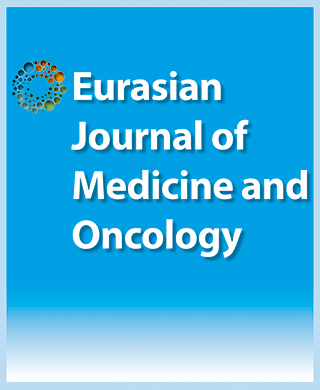

The Association of Globulin Level with Treatment Response and Overall Survival in Patients with Multiple Myeloma
Rafet Eren1, Ozlem Ozdemir2, Ceyda Aslan1, Mehmet Hilmi Dogu1, Sermin Altindal1, Osman Yokus1, Elif Suyani11Department of Hematology, University of Health Sciences, Istanbul Training and Research Hospital, Istanbul, Turkey, 2Department of Internal Medicine, University of Health Sciences, Istanbul Training and Research Hospital, Istanbul, Turkey,
Objectives: An increased globulin level, along with a decreased albumin level, is one of the hallmarks of multiple myeloma (MM). Albumin level has been included in the risk assessment of patients with MM; however, there are insufficient data on the prognostic value of globulin level. The aim of this study was to determine the association of globulin level at diagnosis with the treatment response and overall survival (OS) in patients with MM. Methods: This study was a retrospective analysis of 30 patients who were diagnosed with MM, followed up, and had their globulin level recorded at the time of diagnosis at the University of Health Sciences Istanbul Training and Research Hospital Department of Hematology between June 2013 and August 2016. Results: The median age of the patients was 61 years (range: 34-71 years). Eleven patients were female (36.6%) and 19 were male (63.4%). The median globulin level was 4.98 g/dL (range: 2.3-11.6 g/dL), and the cut-off value was 4.9 g/dL, according to the median. The patients were divided into 2 groups: >4.9 g/dL and <4.9 g/dL. Fifteen patients (50%) had a globulin value <4.9 g/dL, whereas 15 (50%) had a globulin value of >4.9 g/dL. The groups were comparable in terms of gender, age, Durie-Salmon stages, kappa/lambda ratios, creatinine value, beta-2 microglobulin level, lactate dehydrogenase level, OS, and treatment response rates (p>0.05). The globulin level was not significantly associated with treatment response or OS (p>0.05). Conclusion: This study is the first to investigate the role of globulin in patients with MM. An increased globulin level during the course of MM is not a concern for clinicians, as it does not appear to negatively affect treatment response or OS.
Cite This Article
Eren R, Ozdemir O, Aslan C, Dogu M, Altindal S, Yokus O, et al. The Association of Globulin Level with Treatment Response and Overall Survival in Patients with Multiple Myeloma. EJMO. 2018; 2(2): 61-64
Corresponding Author: Elif Suyani



